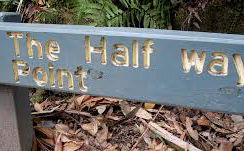Remember our Winter special where kids under 12 stay free Volmoed's 40th anniversary
Beginning of Lent 2020 (Br Scott Wesley)
Yesterday, Ash Wednesday, was the official start of the Season of Lent. Lent and Advent have a similar function in the calendar – they both provide a season of contemplation and reflection leading up to the defining events of Christian life, the birth of Jesus and the resurrection of Jesus.
By tradition, there are two primary intentions for Lent. In the first half we are called to reflect and repent. In the second, our focus is directed to Jesus’ journey to Jerusalem – to crucifixion... and resurrection.

It is a somber, penitential season. It goes against our modern culture. Of course, standing apart from culture is just where we should want to be as followers of Jesus.
I want to start by considering what the Rule of Benedict says about Lent:
The life of a monk (for the purposes of this sermon we are all monks...) ought to be a continuous Lent. Since few, however, have the strength for this, we urge the entire community during these days of Lent to keep its manner of life most pure and to wash away in this holy season the negligences of other times. This we can do in a fitting manner by refusing to indulge evil habits and by devoting ourselves to prayer with tears, to reading, to compunction of heart and self-denial.
During these days, therefore, we will add to the usual measure of our service something by way of private prayer and abstinence from food or drink, so that each of us will have something above the assigned measure to offer God of his own will with the joy of the Holy Spirit.
In other words, let each one deny himself some food, drink, sleep, needless talking and idle jesting, and look forward to Holy Easter with joy and spiritual longing – Everyone should, however, make known to the abbot what he intends to do, since it ought to be done with the abbot’s prayer and approval. Whatever is undertaken without permission of the spiritual father will be reckoned as presumption and vainglory, not deserving a reward. Therefore, everything must be done with the abbot's approval.
When I was in 5th grade (about 10 years old), a Roman Catholic classmate of mine announced at about this time of the year that she was giving up coffee for Lent. It was rather ingenious. She was required to report something she was giving up to the priest. And since she did not, in fact, drink coffee, she could meet the requirement with no particular inconvenience.

When you are ten years old, it seems like a pretty good answer...
She even met the spirit of Benedict's caution. She did not have an abbot to tell, but she was telling the appropriate spiritual authority – her priest. What I have never known is the outcome – I will forever wonder what the priest may have said to her in response.
St Benedict, and my 5th grade classmate, have something to tell us about what we do for Lent – in some way they are telling us the same thing... We have developed, in our tradition, the belief that to be really effective, a spiritual practice has to be heroic, perhaps even draconian.
What that intelligent 5th grader was engaging in was a practice of minimal, rather than maximal displacement. OK – her particular plan may have been sub-minimal... it asked absolutely nothing of her... but erring on the side of minimal may be of more spiritual benefit than we think.
Benedict's counsel guides us in the same direction. “Let each deny him or her-self some food, drink, etc.” I'm not in 5th grade and I do drink coffee. If I were to implement my classmate's plan in accordance with the rule of Benedict, I might be looking to give up one cup of coffee a day, or to not drink coffee one day of the week... to give up some, not all.
Benedict is clear in purpose: We will add something by way of private prayer and take away something from food or drink, so that we will have something additional to offer God.
A heroic form of fasting too easily becomes a spiritual destination rather than a spiritual tool. If I give up chocolate for Lent, then chocolate, or at least that empty space where chocolate used to be, becomes the focus of my Lenten practice. What strange kind of offering is that?
I love Benedict's particularly moderate approach. He has a list: food, sleep, needless talking and idle jesting. Only talking and jesting get qualifiers, but you don't need to know a great deal about St Benedict to know that he never encourages anybody to go entirely without food or sleep. As we say, we’re Benedictines, not Franciscans... Benedict doesn't need to qualify those because we know the rule still calls us to meals and to bed each day. Needless talk and idle jesting imply that there is still room for purposeful talk and perhaps even some jesting – as long as it's not idle...
The danger lies in presumption and vainglory. They are spiritually deadly. Presumption puts me, myself, before God. A particularly severe observance of Lent encourages me to presume that I can, or have, achieved something important... something especially pleasing to God. That is vainglory – empty boasting. The Kingdom of God is a Kingdom of justice and love... Heroic deprivation does not advance either.
We need to step into Lent, not leap into it, making little adjustments in order to free ourselves from worldly attachments. Massive dislocations and heroic deprivations just change the nature of our enslavement. We substitute a positive attachment – I need another cup of coffee... for a negative attachment – I will not drink coffee at all under any circumstances... no matter how much I’d love a cup of coffee... We’re just as attached, just to the absence rather than the presence.
On Ash Wednesday we are reminded that we are dust, and to dust we will return. This is a perspective that allows little space for presumption and vainglory. There is no point in attachment, in storing up the treasures of this earth. There is no value in a big and grand show of piety. I am still just dust.
We are to love one another as God loves us. The less preoccupied I am with indulging and comforting myself, the more able I am to love others and to love God. And just to be clear, loving God is loving others.
Repentance, our focus in this beginning of Lent, is worth some exploration. In English, and in languages that have their toes resting on Latin, the notion of repentance includes sorrow and regret. Our toughest prisons in the US are called Penitentiaries. Inmates are meant to contemplate their wickedness, repent, and amend their lives.
In reality, these institutions do not help people amend their lives but rather turn life into punishment. A place where we are confronted daily with our horrible sinfulness does not reconcile with the boundless love and forgiveness of God. Such a place denies the grace that Jesus bestows on us. Jesus does not want to lock us up. Jesus wants to set us free. What our culture believes about penitence may not be spiritually healthy at all. So, let's consider what Jesus may have meant.

Jesus, contrary to some popular beliefs, didn’t speak Latin. He didn’t speak English either. As for Jesus speaking Afrikaans, who can say. But when Jesus spoke of repentance, he most likely used the word “metanoia” - a Greek word that means something like turning around or changing direction. It is a thoughtful and reflective process. In our tradition it is quite literally the turning from following my own heart to following Jesus.
Repentance isn’t about feeling bad. It's about giving our selves over to the uninhibited and seemingly reckless love that is God. The more I allow myself to live into God’s love, the more I am able to love God’s children and all of God’s wonderful creation. That is the work of repentance... the work of Lent... the giving up of my carefully guarded and metered love for the unbound generosity of God’s love.
Do I get there all at once? Do I even get there in the span of my life? Probably not. And that’s OK. Jesus calls us to follow, not to arrive.
As I do the work of reflection that Lent calls for it will surely be distressing. I fall short – a lot... I’d love to say that I am a pure and holy monk with never an impure or evil thought, let alone deed. And if you believe that then, as we say in the US, I’ve got a bridge I’ll sell you...
If it starts to feel hopeless – then I will try to remember to remind myself that I’m in a process. I’m following Jesus as best I can. And I can take great comfort in the lives of those early followers – Thomas who was filled with doubt... Peter who denied any knowledge of Jesus at all... Judas who betrayed Jesus... The whole drowsy bunch who couldn’t stay awake with Jesus in Gethsemane. I fit right in. Thankfully Jesus calls us as we are to follow.
Repentance, the turning of my life to follow Jesus, is work that I can do at each step of the journey. And if I get a step wrong, that is OK. It's just another opportunity to repent – to turn and change direction.
Further Reading
Changes: From changing the little slope to the Chapel into Jacob's ladder To the Brothers changing their address








Share This Post